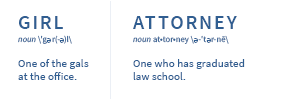From Above the Law authored by Kathryn Rubino:
“Women attorneys know the score. They know that despite what equality might demand, the reality of life in the courtroom means dealing with all sorts of sexist BS. And one way things just aren’t fair is how women and men are judged differently when they get angry.
The ABA Journal reports on a new study, to be released in September, performed by University of California at Hastings law professor Joan Williams and the Center for WorkLife Law for the ABA Commission on Women in the Profession and the Minority Corporate Counsel Association called “You Can’t Change What You Can’t See: Interrupting Racial & Gender Bias in the Legal Profession,” which describes the ways men and women are free to express anger as attorneys. They surveyed almost 3,000 lawyers and did a separate study of courtroom closing arguments, and found some disturbing results:
Fifty-six percent of white men felt free to express anger, compared to only 40 percent of women of color and 44 percent of white women.
Two-thirds of men said they were rarely interrupted, compared to half of the women. The results didn’t differ by race.
Sixty-two percent of white men said they are not penalized for being assertive, compared to only 46 percent of women of color and 48 percent of white women.
These results are augmented by another study, published in Law and Human Behavior. That study, led by Arizona State professor Jessica Salerno, found women are penalized when they show anger in the courtroom, which is the opposite of how men displaying anger are treated, as reported by ASU Now:
“A good attorney is expected to show traditionally male characteristics in court — anger, aggression, power. But what’s happening is that men benefit from this, while we are penalizing women for showing these same characteristics,” said Jessica Salerno, an ASU psychology assistant professor and lead researcher on the study. “We watch so many courtroom dramas where lawyers are expressing emotion, and there are fireworks in the courtroom. People expect attorneys to express themselves this way. This expectation sets men up well for success, but for women it backfires.”
In the study, ~700 people watched videos of male or female lawyers giving an angry closing argument. The study participants positively cited aspects of the angry closing in saying they would hire the male attorneys; conversely, those same characteristics were seen as a negative reason to not hire a female attorney.”
